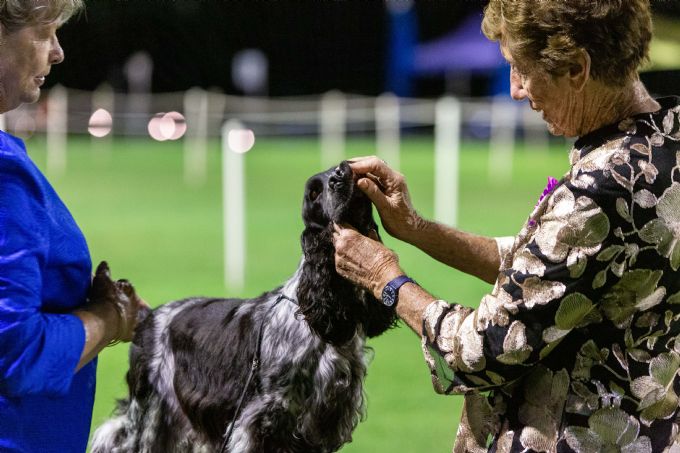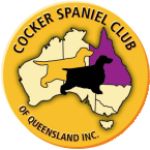Health Testing
Sub-links for this page
- Where to get your health tests
- DOGS AUSTRALIA Code of Practice for Hereditary Diseases
- Eye Conditions
- Familial Nephropathy (FN)
- Adult Onset Neuropathy (AON)
- Hip and Elbow Dysplasia
- Black Hair Follicular Dysplasia
- Acral Mutilation Syndrome (AMS)

The Cocker Spaniel is one of the most popular breeds around the world. However, like all dogs whether or not purebred, the breed has some known health issues or concerns.
Over the years, breeders have become so very fortunate with the advances of Veterinary Science, and the diligence of breeders to provide samples to enable markers to be found for some genetic testing.
In Australia, our ANKC has no mandatory health testing regime for this breed. Overseas in different countries where health testing is part of the rigour of purebred breeding, there are tests that are required.
Most diligent breeders will have moved with the times here in Australia and will have tested most of their breeding stock. It is only with continued diligence that we can hope that over time, the tests that are available are used by all to assure the health of our breed.
The most common tests that breeders will provide you with copies of the tests they have undertaken to assure they are doing the very best they can for the health and well being of the breed are listed below. In Queensland, both the sire and dam (mum and dad) of litters registered are now required to be DNA profiled to assure their breeding heritage. If your new puppy has Full Register pedigree papers (and bred in Queensland) your breeder will also supply you with the DNA profile for your puppy.
The 'most commonly recognised' testing that will be carried out by diligent breeders is listed below:
PRA (Progressive Retinal Atrophy) prcd-PRA
An inherited eye disease found in many breeds of dogs with varying ages of onset. There are various types of PRA but the one most commonly seen in Cockers is GPRA (General Progressive Retinal Atrophy) also known as prcd-PRA. This results in night blindness gradually leading to total blindness. In Cockers, PRA has a variable age of onset, from as early as 18 months to as late as 7 years. It is inherited as a simple Autosomal Recessivegene, meaning that a copy of the PRA gene must be inherited from both parents for the disease to occur.
With recessive conditions like PRA, there are 3 genetic categories, affected, normal and carriers. Affected animals have two copies of the faulty PRA gene, one inherited from each parent. Carrier animals have one faulty copy of the PRA gene but appear perfectly healthy and cannot be distinguished from normal dogs by eye screening. Normal animals are entirely free of the faulty gene. The difficulty was that until recent years breeders had no way of identifying which category their breeding stock fell into as the only screening test available (eye testing by an eye specialist) could only determine if a dog was clinically clear of the disease at the time of testing. It could not determine whether the dog was a carrier or whether the dog would go on to develop the disease at some time in the future.
The development of a marker gene test for prcd-PRA had been available now for several years and gives a good indication of the status of dogs tested. Dogs which have been DNA tested as Carriers of this disease should only be mated to dogs which have been tested as Clear/Normal to avoid producing affected puppies.
FAMILIAL NEPHROPATHY - AHRN (FN)
Familial Nephropathy (FN), a fatal kidney disease in young Cockers, was unfortunately quite prevalent in the breed in the 1980's until research stablished that this was a hereditary condition with a simple recessive mode of inheritance (as with PRA). A Control Scheme was set up by The Cocker Club UK in the mid 1980's under which, all dogs & bitches known to have produced confirmed cases of FN were withdrawn from breeding and details of these carrier animals were published & made available to members & other breeders so that sensible decisions could be made in the selection of breeding stock. The success of this Control Scheme can be demonstrated by the fact that in recent years, only a small number of confirmed cases have been reported.
Dogs which have been DNA tested as Carriers of this disease should only be mated to dogs which have been tested as Clear/Normal to avoid producing affected puppies.
AON - ADULT ONSET NEUROPATHY
AN is another Autosomal Recessive condition seen in some older Cockers (typically aged 7-9). It is a progressive weakness due to a neuropathy which results initially in a wobbly or uncoordinated gait affecting the hind limbs (the stance is wide and hocks will drop lower to the ground). As the condition advances, the front legs are also affected so that the dog is unable to walk and difficulties in swallowing are also seen (progression takes 3 to 4 years). A DNA test has been developed in the USA by the University of Missouri and is now available from the Orthopaedic Foundation of America:
https://www.ofa.org/diseases/dna-tested-diseases/adult-onset-neuropathy
This condition was initially thought to affect only solid Cockers but carriers have now been detected in all colours across the world. As with any other Autosomal Recessive condition, a copy of the AN gene must be inherited from both parents for the disease to occur. With recessive conditions like AN, there are 3 genetic categories, affected, normal and carriers.
Breeders can use the available DNA test to ensure that Carriers/Affected dogs are only mated to Normal (Clear) dogs to avoid producing affected progeny.
The above THREE tests are done via a simple cheek swab - sent off and results returned to the registered owner of the dog. The dog is positively identified by microchip to assure the result. Ask yourself is it worth it to NOT have tested a dog before any breeding is undertaken.
HIP AND ELBOW DYSPLASIA - Hip and Elbow Scoring
Hip Dysplasia (abnormal development of the hip joint) is generally associated with bigger breeds of dog but it can be found in any breed, including Cockers. It can cause lameness & pain in severe cases or produce no noticeable symptoms in minor cases.
HD does not have a simple pattern of inheritance (it is a polygeniccondition meaning it is controlled by several different genes) and whether an animal will develop HD is also influenced by external factors such as diet and exercise. At present, the incidence of HD in the breed is being monitored to determine if there is a problem. In the UK the median hipscore for the breed is currently 10 (source: The Cocker Spaniel Club UK) the median hipscore in Australia is 16.1. Looking at the wide variation of the median score, it would appear that breeders in Australia are working hard to reduce the incidence of HD in the breed, and using the CHEDS scheme by the ANKC. The CHEDS (Canine Hip and Elbow Dysplasia Scheme). Dogs are radiographed by a Veterinarian and the xrays and submission form are sent to a panel for scoring.
-
Results will be directly recorded by the reader on the ANKC Ltd ORCHID (Officially Registered Canine Health Information Database). From the resulting statistics, there are be breed specific averages available, updated regularly.
There are of course, many other health concerns that may appear in the breed as well, however, at this point in time there are no specific tests available for breeder to use as tools to guide their breeding.
Auto-Immune Disease is an umbrella name and covers different immune-mediated diseases of the dog, such as Addisons Disease, Hypothyroidism, Haemolytic Anaemia and others. At present there is research working towards a genetic marker for Addisons which may prove to be beneficial in the future.
Auto-immune problems appear in all the dog population pure bred and otherwise, although some breeds appear to be predisposed to certain conditions. Cockers Spaniels have been linked to Haemolytic Anaemia, although research so far does not indicate that the problem is inherited. It seems that environment, age and sex play an important role in an animal developing an auto-immune condition. Research is continuing & The Cocker Club will carry on monitoring the situation.
Like any other purchase you make, please do your research.
Ask yourself are you willing to risk a puppy that has not been tested.
The Cocker Spaniel Club of Qld Inc recommends that every new puppy buyer be aware of the health issues that surround our beautiful breed and we encourage our members to be open and honest with the health of the breed. Unless a breeder has undertaken the testing and can show you the documented results you have no way of knowing if the parents of your new puppy are clear, carriers or afflicted.
Cocker Spaniel Club of Qld Members are encouraged via our Code of Ethics to undertake health testing and share the results as well, for the betterment of the breed.
Contact Details
The Secretary, Cocker Spaniel Club of Qld IncBrisbane, QLD, Australia
Email : [email protected]
